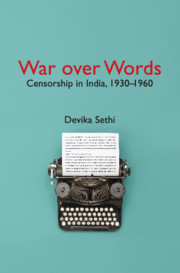Book contents
- Frontmatter
- Dedication
- Contents
- Acknowledgements
- List of Abbreviations
- Introduction
- Part I Guarding the State, Protecting the Public: Censorship Policies and Practices in the 1930s
- Part II Protests and Publicity: Banning Non-Indian Authors
- 3 Critiques of Indian Society: Katherine Mayo's Long Shadow
- 4 ‘Hurt’ or ‘Hatred’? Publications by Non-Indians Offensive to Indian Muslims
- Part III Political or Military? Censorship in India during the Second World War
- Part IV The Censored Turn Censors: Freedom and Free Speech
- Conclusion
- Epilogue
- Bibliography
- Name Index
- General Index
4 - ‘Hurt’ or ‘Hatred’? Publications by Non-Indians Offensive to Indian Muslims
from Part II - Protests and Publicity: Banning Non-Indian Authors
Published online by Cambridge University Press: 26 April 2019
- Frontmatter
- Dedication
- Contents
- Acknowledgements
- List of Abbreviations
- Introduction
- Part I Guarding the State, Protecting the Public: Censorship Policies and Practices in the 1930s
- Part II Protests and Publicity: Banning Non-Indian Authors
- 3 Critiques of Indian Society: Katherine Mayo's Long Shadow
- 4 ‘Hurt’ or ‘Hatred’? Publications by Non-Indians Offensive to Indian Muslims
- Part III Political or Military? Censorship in India during the Second World War
- Part IV The Censored Turn Censors: Freedom and Free Speech
- Conclusion
- Epilogue
- Bibliography
- Name Index
- General Index
Summary
On 30 September 2005, a dozen caricatures of Prophet Muhammad appeared in the Danish newspaper Jyllands-Posten. They were captioned ‘The Face of Muhammad’, and the accompanying editorial criticized the ‘sickly oversensitivity’ of Muslims. Whereas the Western media interpreted the adverse reaction to the cartoons as emanating from the Islamic ban on images (variously interpreted as all images, or images of Muhammad, or religious images), Jamal J. Elias has argued that Muslims were in fact protesting against the ‘intention to cause offence to the prophet and their religion’. Questions of religious sentiment and intention in the context of colonial India have been skilfully analysed by Neeti Nair, who has studied events and debates surrounding the addition of a new section (295A) to the IPC in 1927 penalizing ‘outraging the religious feelings’ of others. Nair has suggested that British intervention in the Rangila Rasul case (involving derogratory references to Prophet Muhammad in a pamphlet produced in 1924 by a Hindu publicist in Lahore) ‘stoked’ the fury of the already enraged Muslim public. In her words, ‘It was the intervention of the British government at this juncture [after the acquittal of the publisher, M. Rajpal by the Punjab High Court in 1927] that reinforced the sense of wrong felt by the Muslim community at large.’ Nair has also demonstrated that far from being an abstract, rarefied entity, the law, lawmakers and lawmaking were all subject to negotiation by pressure groups from within society. These two keywords—intention and offence—are at the heart of the biographies of publications narrated in this chapter.
The case studies (books and articles in popular journals published in Great Britain or the United States between the 1920s and 1940s) discussed in this chapter all have two things in common: one, they were all concerned with representations of Islam and Prophet Muhammad; two, all were written by non-Indian authors and published outside India. During this period there were several publications emanating from Britain that offended a vocal section of Muslims there as well as in India. There were vociferous demands from pressure groups for a ban on these books and popular journals. A survey of cases where the demand for a ban was met, as well as those where it was rejected, helps clarify the criteria used by the GOI and the India Office.
- Type
- Chapter
- Information
- War over Words , pp. 91 - 122Publisher: Cambridge University PressPrint publication year: 2019



